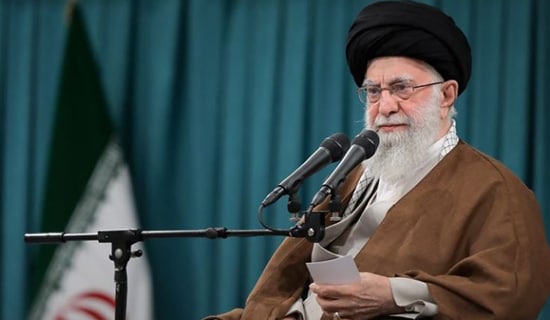Nicolas Sarkozy's rise to power marked the opening of a new chapter in Syria-France relations. After three years of considerable tension between the two countries in the wake of the assassination of former Lebanese prime minister Rafiq Al-Hariri, President Sarkozy wished to thaw the ice and draw closer to Syria. His policy has contributed greatly to ending the international isolation of Syria, and to the improvement of its status in the Middle East.[1]
Sarkozy's policy towards Syria has earned him much praise in the Syrian press, especially in the Al-Watan daily, which is close to the Syrian regime. In the past months, this daily published several articles on France's Middle East policy. The articles credited Senator Philippe Marini, head of the Syrian-French Friendship Association in the French parliament, with promoting the rapprochement between the two countries.[2] They also stated that along with the change in France's attitude towards Syria, there has been a change in its attitude towards Israel, and that Sarkozy is now inclined to accept Israel as the source of the problems in the Middle East.
Following are excerpts from the Al-Watan articles:
Al-Watan: French Researcher Acknowledges Israel Is Source of All Middle East Problems
One of the articles reported on an annual conference of French institutions for Middle East studies, in which these institutions pooled their findings in order to advise the French authorities on Middle East policy. The daily claimed that the conference was attended by a senior official of the French Foreign Ministry, which oversees and finances the activity of the research institutions. It also claimed that one of the conferees surprised his colleagues by announcing that there was one topic worthy of discussion – namely, Israel's existence and role in the Middle East. Al-Watan cited him as saying: "Tell me, in the course of your research, have you encountered [even] one problem in which Israel is not a primary factor...? Even the denominational problem [i.e., the conflicts between Sunnis and Shi'ites, and Christians and Muslims] is related to the existence in the region of a country that belongs to a particular [religious] denomination. Who would have [thought to argue that] denominations have a right [to self-determination] if it were not for Israel, whose entire existence rests on the right [to self-determination] of a [religious] denomination calling itself a nation? Show me one problem that our institutions have studied and which has not turned out to be of Israel's making. Let's abandon our ostrich policy, and stop burying our heads in the sand. Let's reassess the orientation of our research activity, so that we might help the [makers] of strategic political decisions in our country. Let's look at Iran, Turkey, Syria, Iraq, Saudi Arabia, Egypt, Darfur, and Sudan, at the economic crisis in Dubai and at the [overall] economic and social situation in the Middle East, [and see them] in a more objective light..."
The Al-Watan article implied that these statements were endorsed by the French decision-makers. Its author, journalist 'Issa Al-Ayyoubi, cited sources in the Elysee as saying that President Sarkozy "responded favorably to the new suggestion [that emerged from the conference, treating it] as a scientific finding that can alter [France's] thinking." Al-Ayyoubi added that people who recently met with Sarkozy have noticed a change in his perception of the region, reflected in his position on various issues, such as U.N. resolutions 1559 and 1701, Turkey's joining of the E.U., and Iran's nuclear dossier. Al-Ayyoubi commented, "This is the first time that France is not considering the possible reaction of Israel. In fact, it has taken several decisions in [complete] disregard of the Israeli considerations, such as its recent [decisions] on the Lebanese issue..."[3]
Al-Watan: French Diplomat Says Israel's Nature and Role Must Change
Al-Watan also brought statements by "a French diplomat who served in Beirut," who told the daily of his satisfaction with the recent developments in the Middle East. He said that, in France's eyes, the new geopolitical situation in the region is more logical and realistic than the previous situation. Furthermore, Turkey's joining the 'resistance camp' is a development that significantly alters the power balance in the Middle East, lending a new geostrategic dimension to the resistance policy launched by Syria an Iran. The diplomat stated that there is no question regarding Israel's existence; however, its nature and role must be reassessed, and the Israelis must understand that times have changed and their role is now different.
Analyzing these statements, the Al-Watan journalist commented that it is the resolute stand of the resistance camp that had brought about the shift in France's approach to Syria and to other Middle East countries. According to him, France welcomes the pro-Syrian shift in Saudi Arabia's position, and on the other hand is amazed at the failure of Egyptian President Hosni Mubarak to adapt his policies to the developments in the region.[4]
Al-Watan: Kouchner's Statements Do Not Reflect Sarkozy's Position
Several weeks after the publication of this analysis, French Foreign Minister Bernard Kouchner came out against Syria's allies, Hizbullah and Iran, in a manner that contradicted Al-Watan's claims about a turnaround in France's stance towards Syria. For example, following his January 21, 2010 meeting with Lebanese Prime Minister Sa'd Al-Hariri, Kouchner said that Lebanon's problem was not Israel but Hizbullah, which is likely to attack Israel in furtherance of Iranian interests. Earlier, he stated that France was against canceling U.N. Resolution 1559, which has not been fully implemented, and against ending the mandate of Terje Roed-Larsen, the special U.N. envoy for the implementation of this resolution. Kouchner's statement came immediately in the wake of reports that Syria had demanded to end Larsen's mission on the grounds that Syria had complied with the resolution and that Larsen was pursuing an anti-Syrian agenda.[5]
In an attempt to reconcile the reality of Kouchner's statements with Al-Watan's descriptions, an Al-Watan article claimed that Kouchner's stance was at odds with Sarkozy's policy, and that his statements about Hizbullah had embarrassed the French president. The article stated: "When President Sarkozy appointed Kouchner as his foreign minister, he did not appoint him as a rebel but as someone who agreed to obey him. It has not been easy for Sarkozy to bear the consequences of this appointment within his party and in France." The article stated further that this was not the first time that Kouchner had disregarded Sarkozy's instructions regarding the Middle East, and that the foreign minister's "ties with the New Conservatives were more powerful than his [concern for] his country's interests and its status in the Arab world."
The article stated further that "Sarkozy, and the majority of Frenchmen, believe that their interest lies [in rapprochement] with the Arab world, from the [Mediterranean] Sea to the Gulf. This is a world that does not accept Kouchner's justifications of the Zionist aggression... Kouchner has embarrassed France, which has pioneered the rejection of aggression. [In fact,] he has embarrassed Europe many times, most recently yesterday, when he spoke of accelerating [the process of] imposing sanctions on Iran... when France has rejected the principle of sanctions, which yields no results..."[6][1] See MEMRI Inquiry and Analysis No. 583, "Syria Regains Pivotal Regional, Int'l Role – The Triumph of the 'Course of Resistance,'" January 29, 2010, Syria Regains Pivotal Regional, Int'l Role – The Triumph of the 'Course of Resistance'.
[2] Al-Watan (Syria), October 22, 2009. Marini was recently appointed Sarkozy's envoy to Syria. Al-Watan (Syria), January 31, 2010.
[3] Al-Watan (Syria), January 6, 2010.
[4] Al-Watan (Syria), August 23, 2009. In the wake of the Al-Hariri Assassination, Saudi Arabia became one of the chief opponents of Syria in the Arab world. However, in the past year it has adopted a policy of rapprochement with Syria, which culminated in King 'Abdallah's visit to this country on October 7, 2009. Egypt, on the other hand, has stuck to its positions, and its relations with Syria remain cool. See MEMRI Inquiry and Analysis No. 583, "Syria Regains Pivotal Regional, Int'l Role – The Triumph of the 'Course of Resistance,'" January 29, 2010, Syria Regains Pivotal Regional, Int'l Role – The Triumph of the 'Course of Resistance'; MEMRI Inquiry and Analysis No. 591, "Syrian Daily Challenges Egypt's Status in Arab World," February 24, 2010, Syrian Daily Challenges Egypt's Status in Arab World.
[5] Al-Safir (Syria), December 21, 2009.
[6] Al-Watan (Syria), January 27, 2010.








